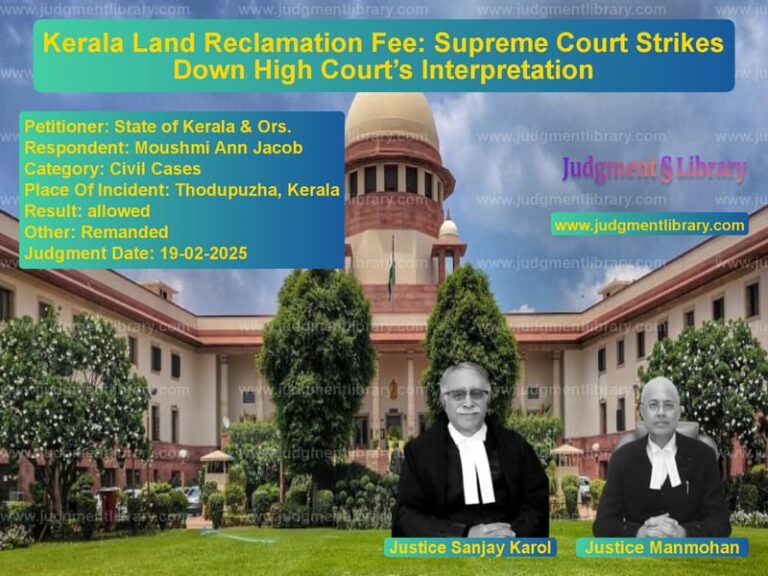Landmark Judgment on NDPS Act: Supreme Court Quashes Proceedings Against Police Officer
The Supreme Court of India, in its ruling in Bharti Arora vs. The State of Haryana, addressed critical legal issues surrounding the application of the Narcotic Drugs and Psychotropic Substances Act, 1985 (NDPS Act) and the criminal procedure involved in prosecuting government officers. This judgment, delivered by a bench comprising B.R. Gavai, Prashant Kumar Mishra, and K.V. Viswanathan, analyzed procedural irregularities, the principle of natural justice, and the misuse of prosecutorial powers against a senior police officer.
Background of the Case
The case stemmed from an incident on January 6, 2005, when a raid led by the Haryana Police resulted in the arrest of Ran Singh for allegedly possessing 8.7 kilograms of opium. The charges were framed under Section 18 of the NDPS Act. During the trial, conflicting reports emerged regarding whether the opium was planted by other individuals due to personal enmity. The accused claimed that police officers, including the then Superintendent of Police, Bharti Arora, manipulated the investigation.
Despite multiple investigations, a Special Judge issued a Show-Cause Notice under Section 58 of the NDPS Act against Arora and other officers, alleging procedural misconduct. The High Court later upheld these proceedings. Aggrieved by the decision, Bharti Arora appealed to the Supreme Court.
Petitioner’s Arguments
Represented by Senior Counsel A.N.S. Nadkarni, the petitioner, Bharti Arora, contended that:
- The Special Judge’s order was passed without prior notice, violating the principle of natural justice.
- She was neither part of the original raid nor the investigating officer, making her prosecution baseless.
- The findings against her were recorded ex parte, without giving her an opportunity to present her defense.
- The Special Judge rushed the proceedings, ignoring her legitimate requests for adjournments due to pressing law and order duties.
- The NDPS Act required a summary trial before a Magistrate for an offense under Section 58, which was not followed.
Respondent’s Arguments
The State of Haryana, represented by Senior Additional Advocate General Lokesh Sinhal, argued that:
- The Special Judge had jurisdiction to issue a notice under Section 58 of the NDPS Act.
- The case against the petitioner was based on the judicial findings of the trial court.
- Though Arora was transferred, her actions while serving as SP Kurukshetra contributed to procedural irregularities.
- Proceedings should continue as per the findings of the Special Judge.
Supreme Court’s Observations and Judgment
Violation of Natural Justice
The Supreme Court strongly condemned the procedural lapses, stating:
“The learned Special Judge recorded adverse findings against the appellant without issuing her a prior notice. Justice must not only be done but must manifestly be seen to be done.”
The Court observed that the findings against Arora were based on mere arguments made by the defense during trial, without any independent inquiry.
Improper Legal Proceedings
The Court criticized the Special Judge’s handling of the case, noting:
“The statutory scheme, as per Section 36-A(5) of the NDPS Act, mandates a summary trial before a Magistrate for offenses punishable under Section 58. The Special Judge had no jurisdiction to conduct these proceedings.”
Judicial Bias and Procedural Impropriety
The Supreme Court found that the Special Judge acted with undue haste, highlighting:
- Multiple hearings were conducted in just ten days.
- Despite receiving a transfer order, the Special Judge continued to pass orders against Arora.
- The final order was sealed and kept for the successor judge, which the Supreme Court found highly irregular.
Good Faith Protection
Referring to Section 69 of the NDPS Act, the Court ruled that government officers acting in good faith are protected from prosecution:
“Anything done with due care and attention, which is not mala fide, is presumed to have been done in good faith.”
Setting Aside the High Court’s Order
The Court concluded that the High Court erred in dismissing the petition and failing to recognize the procedural violations. Accordingly, it ruled:
- The appeal was allowed.
- The High Court’s order of October 14, 2010 was quashed.
- The Special Judge’s Show-Cause Notice and all related proceedings were nullified.
Impact of the Judgment
This ruling reaffirms the importance of procedural fairness and judicial impartiality. It also underscores the necessity of adhering to the due process of law while prosecuting public officials. The Supreme Court’s intervention serves as a precedent for ensuring that legal proceedings are conducted within the boundaries of justice, particularly under stringent laws like the NDPS Act.
Petitioner Name: Bharti Arora.Respondent Name: The State of Haryana.Judgment By: Justice B.R. Gavai, Justice Prashant Kumar Mishra, Justice K.V. Viswanathan.Place Of Incident: Kurukshetra, Haryana.Judgment Date: 13-12-2024.
Don’t miss out on the full details! Download the complete judgment in PDF format below and gain valuable insights instantly!
Download Judgment: bharti-arora-vs-the-state-of-haryana-supreme-court-of-india-judgment-dated-13-12-2024.pdf
Directly Download Judgment: Directly download this Judgment
See all petitions in Bail and Anticipatory Bail
See all petitions in Custodial Deaths and Police Misconduct
See all petitions in Fraud and Forgery
See all petitions in Attempt to Murder Cases
See all petitions in Judgment by B R Gavai
See all petitions in Judgment by Prashant Kumar Mishra
See all petitions in Judgment by K.V. Viswanathan
See all petitions in allowed
See all petitions in Quashed
See all petitions in supreme court of India judgments December 2024
See all petitions in 2024 judgments
See all posts in Criminal Cases Category
See all allowed petitions in Criminal Cases Category
See all Dismissed petitions in Criminal Cases Category
See all partially allowed petitions in Criminal Cases Category







